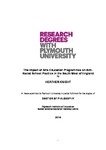The Impact of Arts Education Programmes on Anti-Racist School Practice in the South West of England
| dc.contributor.supervisor | Quinn, Jocey | |
| dc.contributor.author | Knight, Heather | |
| dc.contributor.other | Plymouth Institute of Education | en_US |
| dc.date.accessioned | 2018-03-22T14:49:47Z | |
| dc.date.available | 2018-03-22T14:49:47Z | |
| dc.date.issued | 2018 | |
| dc.identifier | 10191373 | en_US |
| dc.identifier.uri | http://hdl.handle.net/10026.1/11161 | |
| dc.description.abstract |
In predominantly White schools, a common belief exists that anti-racist education is unnecessary, despite a rise in the number of people who admit to being racially prejudiced. A colour-blind approach, which silences issues of race, tends to dominate in schools, while, fear of ‘getting it wrong’ prevents meaningful dialogue. My thesis addresses the question, in what ways do arts programmes support anti-racist education in predominantly White areas? This includes two threads. Firstly, I take a critical race theory approach, drawing on Whiteness studies, to explore White teachers' and school students’ assumptions about racism and education. Secondly, using a critical pedagogy framework, I investigate learning through anti-racist arts projects. The fieldwork is ethnographically inspired, including interviews, focus groups and observations of participants’ engagement with arts programmes that visit primary and secondary schools in Devon. I found a gap between theoretical and common understandings of racism. Participants’ conceptualisations of racism shaped their beliefs about anti-racist education and their methods of engagement, which, in the contexts studied, tended towards promoting niceness rather than tackling deep-rooted racism. Furthermore, racism was found to have embodied and aesthetic components, which lead to racist thoughts, feelings and behaviours, either willingly or unwittingly. Teachers’ tendencies to force respect through classroom control appeared ineffective, by masking rather than addressing embodied racism. My research contributes to the literature on critical race theory and Whiteness studies by offering insight into the ways that White teachers and students construct anti-racist practice. My findings add to critical pedagogy by suggesting that when dialogue has been silenced, and fears surround the subject matter, critical art pedagogies that work at the emotional and cognitive levels can offer additional methods of engagement. However, working to uncover embedded racism can challenge the notion of safe classrooms and requires teachers and students to take risks by engaging with the embodied and sensual aspects of racism, which can be both disturbing and exciting. My research offers hope through presenting new ways of thinking about and engaging with, anti-racist school practice in predominantly White areas. | en_US |
| dc.description.sponsorship | This study was financed with the aid of a studentship from the Social Science Doctoral Training Centre at Plymouth University | en_US |
| dc.language.iso | en | |
| dc.publisher | University of Plymouth | |
| dc.subject | Racism | en_US |
| dc.subject | Education | |
| dc.subject | The Arts | |
| dc.subject | Whiteness | |
| dc.subject | School Practice | |
| dc.subject | Critical Pedagogy | |
| dc.subject | Critical Race Theory | |
| dc.subject.classification | PhD | en_US |
| dc.title | The Impact of Arts Education Programmes on Anti-Racist School Practice in the South West of England | en_US |
| dc.type | Thesis | |
| plymouth.version | publishable | en_US |
| dc.identifier.doi | http://dx.doi.org/10.24382/761 | |
| dc.identifier.doi | http://dx.doi.org/10.24382/761 | |
| dc.rights.embargoperiod | No embargo | en_US |
| dc.type.qualification | Doctorate | en_US |
| rioxxterms.version | NA | |
| plymouth.orcid.id | 0000-0003-2442-9728 | en_US |
Files in this item
This item appears in the following Collection(s)
-
01 Research Theses Main Collection
Research Theses Main


